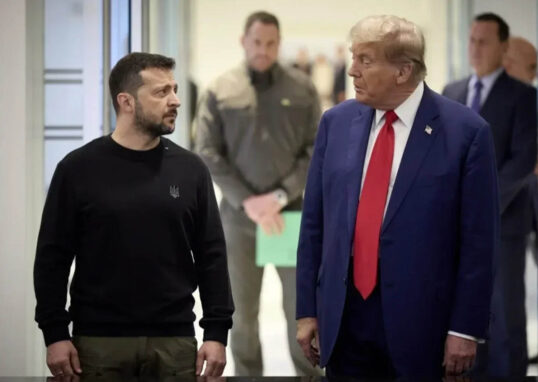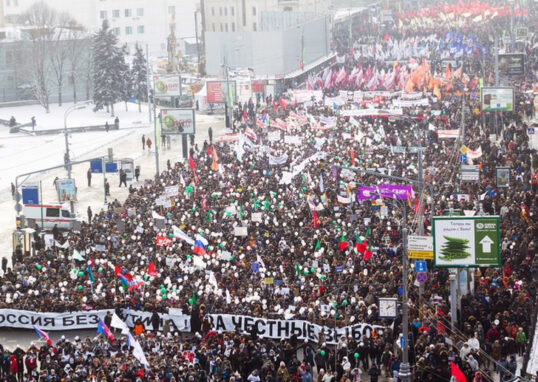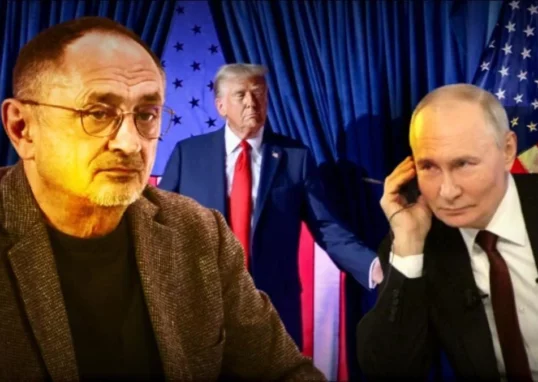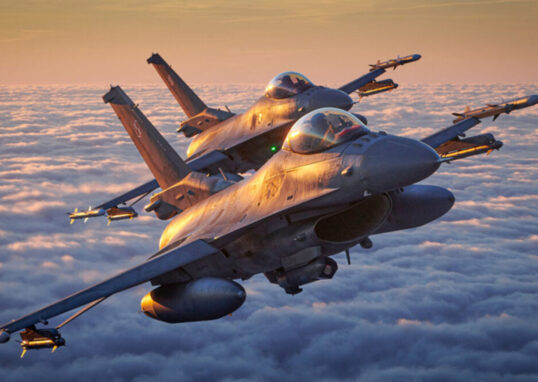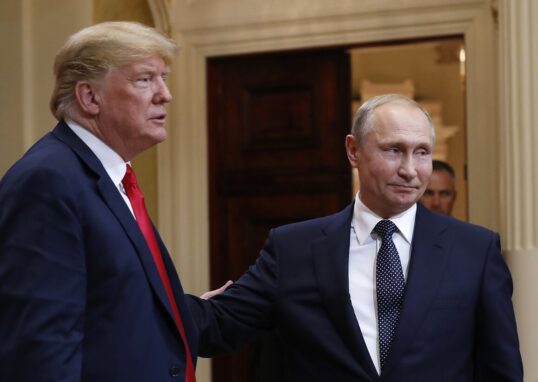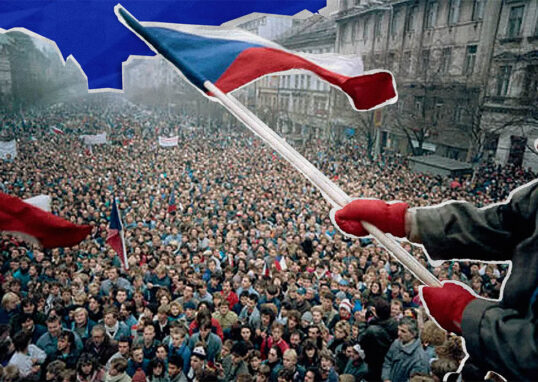This text originally appeared in Russian on Colta, a leading Russian platform for comment and discussion. Colta is funded by donations – find out how you can help here.
Before Crimea, everyone “cooperated with the Russians”. And until mid-2016, no one knew what to think or do with this history of cooperation. Sanctions hardly made a dent in this “cooperation regime”.
But beginning with the US presidential elections, important changes are taking place — and it’s hard to know what to call them or how to describe them. Externally, we see that people who were supposed to communicate with “the Russians” are losing their positions. And this is accompanied by public scandals. It’s not the case that these people cooperated with some questionable goals in mind, but they’d come into contact with a taboo — zashkvar in Russian criminal slang.
No one doubted the loyalty of US national security adviser Michael Flynn, but he resigned because of his “contacts” with the Russians. A few days ago, the vice-speaker of Lithuania’s parliament resigned. Mindaugas Bastys left because the Lithuanian security services refused him access to secret data. But the list of Russian citizens whom Bastys had contact with over the years doesn’t contain anything particularly shocking — representatives of Russian state corporations in Lithuania, the usual suspicious Russian businessmen and so on.
The recent hack of the email account of hitherto unknown Alexander Usovsky, who was working for the Kremlin in Czech Republic, Hungary, Poland, Slovakia and the Balkans, shows that Konstantin Malofeev, an Orthodox Russian businessman known for financing separatists in the Donbas, discussed or in fact conducted operations against elections in Bosnia and Poland.
Malofeev’s activities are an extreme example of Russia’s openly subversive actions in other states. But when you look at Usovsky’s emails, and you’re aware of the state Russian affairs in Europe, you realise that Malofeev’s strategy and tactics are no different from the actions of dozens and hundreds of similar actors beyond Russia’s borders. Before Crimea, for those who cooperated with the “Russians”, these activities looked like “supporting Russia’s interests”. Now these people are beginning to figure out what this really meant.
“What have we got ourselves involved in?” they asked themselves — people who’d performed one-off services or participated in “Petersburg Dialogue” (a German-Russian public form), the Valdai Club, the “Dialogue of Civilisations” (another public forum) and the dozens of other programmes where Russian money was involved.
All these political, cultural and media contacts are nothing compared to the scale of cooperation in business
Members of Russian émigré organisations (which refused to work with the “Russian world” programme fairly early on) have told me that, at the start, they were taken in by film director Nikita Mikhalkov’s initial cultural projects. They sincerely supported the director’s appeal to Russians abroad.
But around 2008 these émigré organisations felt that they were beginning to be recruited into an ideological support campaign for the Kremlin. Many people continued travelling to Moscow for émigré congresses, but already as “observers”. They already decided back then that this was the “New Comintern” and it was wrong to accept their grants. Other people continued to accept the money happily, and sailed off together with the Kremlin in the direction of Crimea.
Money talks
But all these political, cultural and media contacts are nothing compared to the scale of cooperation in business.
For more than a decade, millions of people across the world have been involved in networks of “Russian money”. After all, the large-scale capital flow out of Russia, the partial reinvestment of these funds back into the country through offshore structures and into infrastructure outside of Russia (companies, shares, property, yachts and so on) – this is the gigantic money-moving machine of Putin’s corporate state, which is operated by millions of people (solicitors, politicians, parliamentary deputies, cultural professionals, translators and so on).
As a result, by the time Crimea happened, the Kremlin had a significant lobby at its disposal. This doesn’t mean that people were actually “bought” (to use the language of anti-corruption). People merely “cooperated” and received certain bonuses for this cooperation. If you once took money from an old friend in your past, then, even if you see it in a critical light now, you’ll still maintain your loyalty to him or her in public. Who would want to start a scandal about the misdeeds of someone who once helped, let’s say, to finance your new home? You’d keep quiet.
The retrospective starts now
In other words, for over a decade — since roughly 2004, after Khodorkovsky’s Yukos company was seized — the Russian economy kept its (hard to measure) foreign networks well-oiled.
This wasn’t about corruption in the narrow sense. Of course, in the west, this was seen as economic interaction with a particular kind of “eastern” economy, where everything is accompanied by “signs of gratitude”, “kickbacks”, exchange of various bonuses and preferences, trips to the sauna, hunting expeditions with helicopters and so on. And this wasn’t criminal activity as such. It was seen as part of the “specifics” of dealing with the country. Russia is far from the only economy that operates this way — i.e. through “partnership”. The world’s largest companies opened offices and factories in Russia. And until recently, this was a privileged economy incorporated into the BRICS system.
Putin used Crimea to draw people who’d been involved in partnership into a one-off mobilisation. The Russian president made it necessary for all these “partners” to define their position
Crimea turned the results of this ten-year-long support into a problem. Obviously, Putin used Crimea to draw people who’d been involved in partnership into a one-off mobilisation. The Russian president made it necessary for all these “partners” to define their position. Putin’s “partners” (he often pronounces the word with irony) are often understood in the diplomatic context. But in reality Putin has other “partners” in mind — those millions of people who have for years sat on Russian contracts, Russian money and other forms of interaction with “the Russians”.
Unreliable partners
Now these “partners” have big problems. And I note sadly that their problems are not due to Crimea (as such), the sanctions or counter-sanctions regimes, nor the ambiguity of past participation in toxic projects with “the Russians”. The problem for them is that Putin does not want to stop.
This community would have sighed with relief if Putin had just “signed over the assets to his name”, i.e. taken Crimea and stopped there. But the extreme ambiguity that characterised 2014-2017 continues to be maintained and even expanded: it wasn’t Putin who shot down MH17, but some people working for Konstantin Malofeev; Putin didn’t murder Boris Nemtsov, it was a few Chechen security officers; it wasn’t Putin who hacked the US Democratic Party’s servers, but some hackers — possibly Russian, possibly not (but from Russian servers); Putin didn’t organise the coup attempt in Montenegro, but some unknown individuals; it wasn’t Putin who organised the campaign to destabilise and destroy Ukraine as a state, but Russian presidential adviser Sergei Glazyev; it was some guy named Alexander Usovsky who organised pro-Russian demonstrations in European states (with cash from patriotic Russian businessmen), not Putin. And so on.
Now everyone is looking back on this time and asking themselves: who were really “partnering” with? Maybe it was Russian intelligence?
This list is growing by the day. And yet the Kremlin is not distancing itself from any of this with the previous energy so understandable to its so-called “partners”. The Kremlin doesn’t conduct investigations into any of these issues, but an ambiguous game that can be clearly read as “covering” all of its “own people”.
Thus, the previous decade of developing relationships transforms before our eyes into an “invitation to complicity”. Now everyone is looking back on this time and asking themselves: who were really “partnering” with? Maybe it was Russian intelligence? Or maybe from the very beginning this was just a trick to recruit us for dubious lobbying campaign?
Ambiguity rules
This is all scarily new. Everything that’s happening before our eyes regarding the US State Department and pro-Russian politicians in Europe reveals a complex problem — the borders between lobbying, partnership, espionage, propaganda influence and corruption are being washed out.
Thus a situation arises whereby it is impossible to distinguish between real partnership from participation in a campaign to distort “the borders of the permissible”. Just yesterday you were a “Christian Democrat” developing a partnership with the Russian Federation, and today you’re just a silent participant in the degradation of the very norms of European political culture. You’re not just keeping quiet with a look of shame on your face as you refuse to judge the actions of the Kremlin. It’s actually the opposite. By “remaining loyal” to the results of your previous partnership with the Kremlin, you even raise your skeptical voice: but what’s even criminal in Putin’s politics? And others go like this: “Sanctions are ineffective and Crimea, if I’m honest, was always Russian.”
If it is possible to take a broad view of so-called Kremlin propaganda as the product of work carried by Moscow agencies and marginal sites of leftwing and rightwing critics of US hegemony (and who sympathise with Putin precisely on these grounds), then it’s impossible to take in the Kremlin’s gigantic system of bedding itself into western economic structures. It does not yield to any kind of evaluation. And the same goes for the transformation, or, to be precise, the degradation that the Kremlin has engineered not only among its own citizenry, but various strata of western society, too.
Three years ago, I wrote that Putin was in the process of creating a rightwing Comintern. It’s since become known as the “black Comintern”. But now I think that the current situation is not only more complex, but worse. “Putin’s Comintern” is a rather insignificant and clearly visible section of a much bigger process occurring at different levels of European life, where people — who are not at all involved in radical right- or leftwing politics — are keeping silent on the Kremlin’s actions. They might condemn it, but they still remain loyal. And they are waiting in good faith for Putin “to return to European norms of partnership”.
These people cannot and do not want to see that the ambiguity fostered by the Kremlin over who is responsible for murder, paramilitary groups, armed mercenaries, destabilisation in smaller states is not some temporary phenomenon. It was done on purpose right from the start. And this is how it will continue.
Translated by Tom Rowley.
